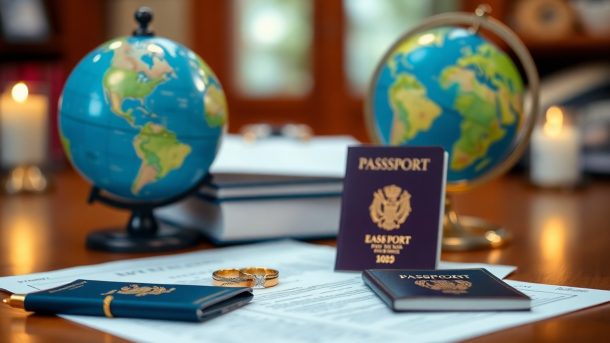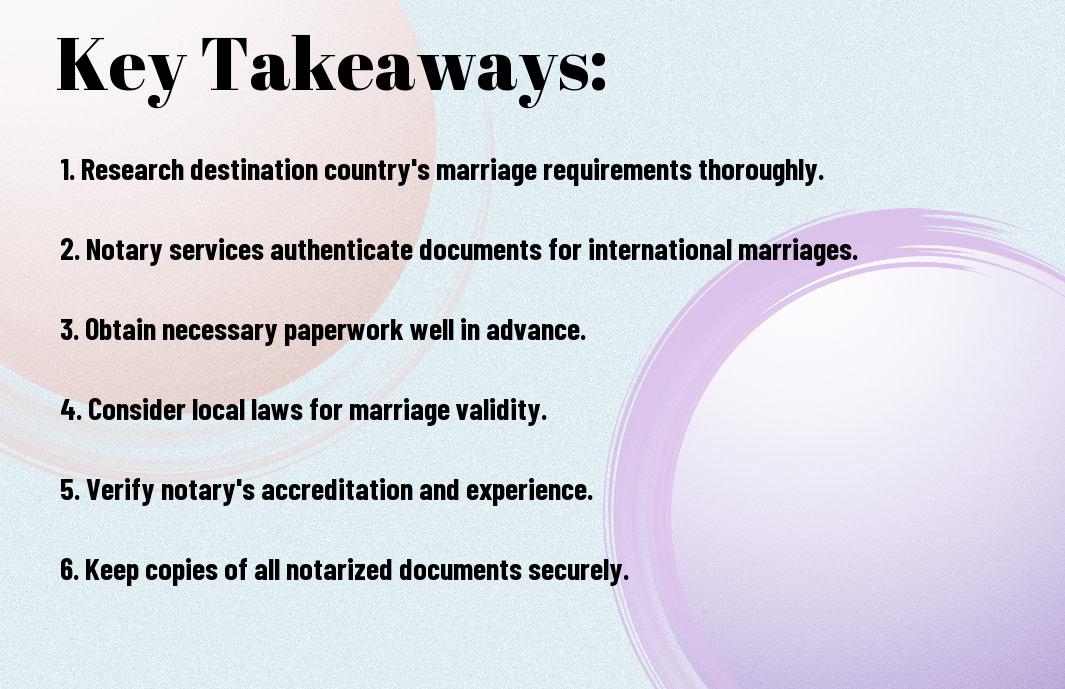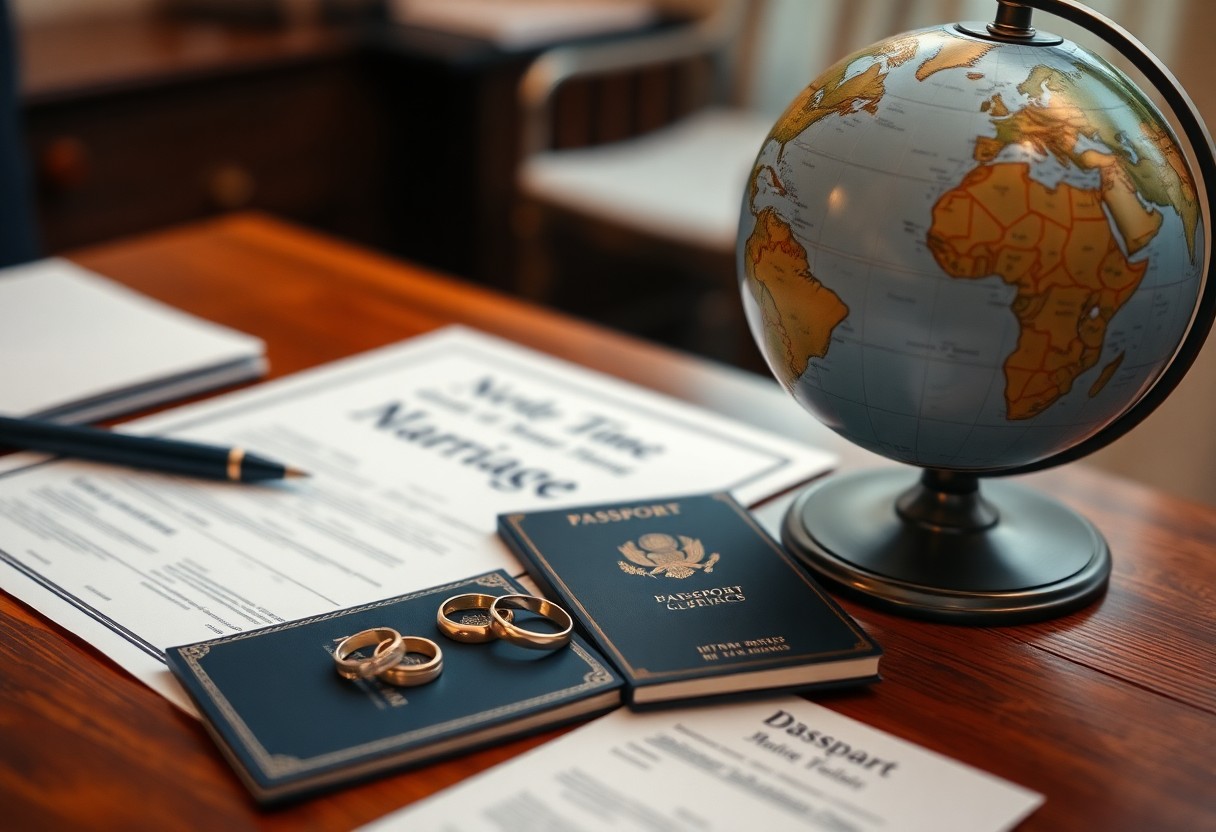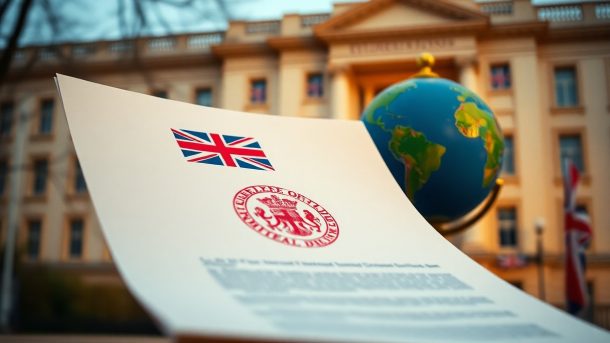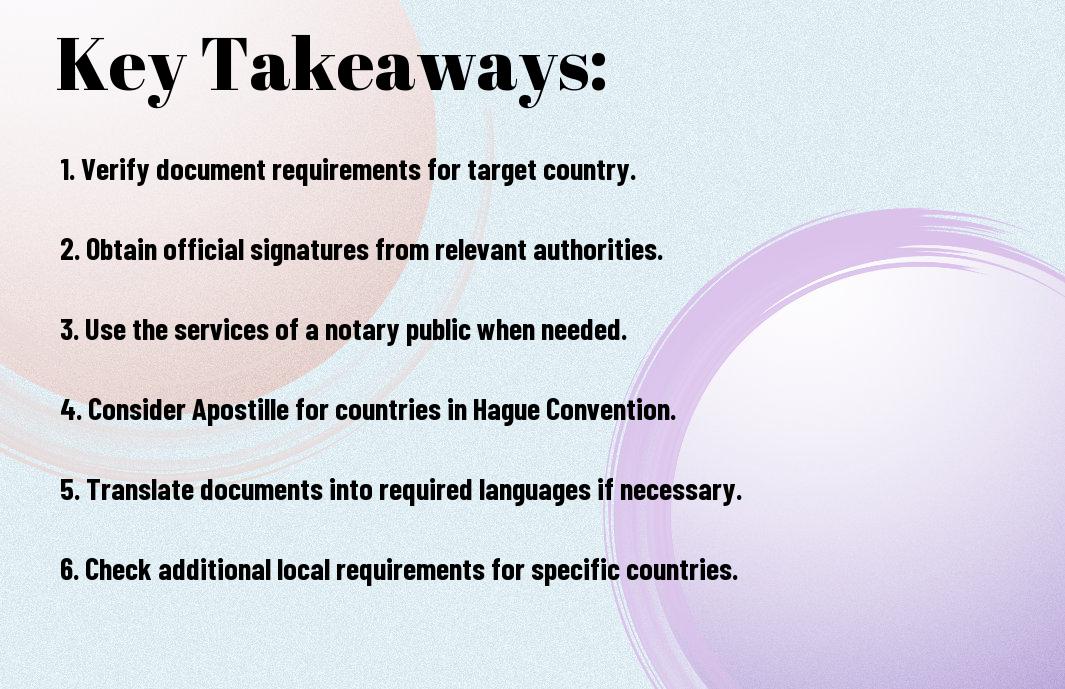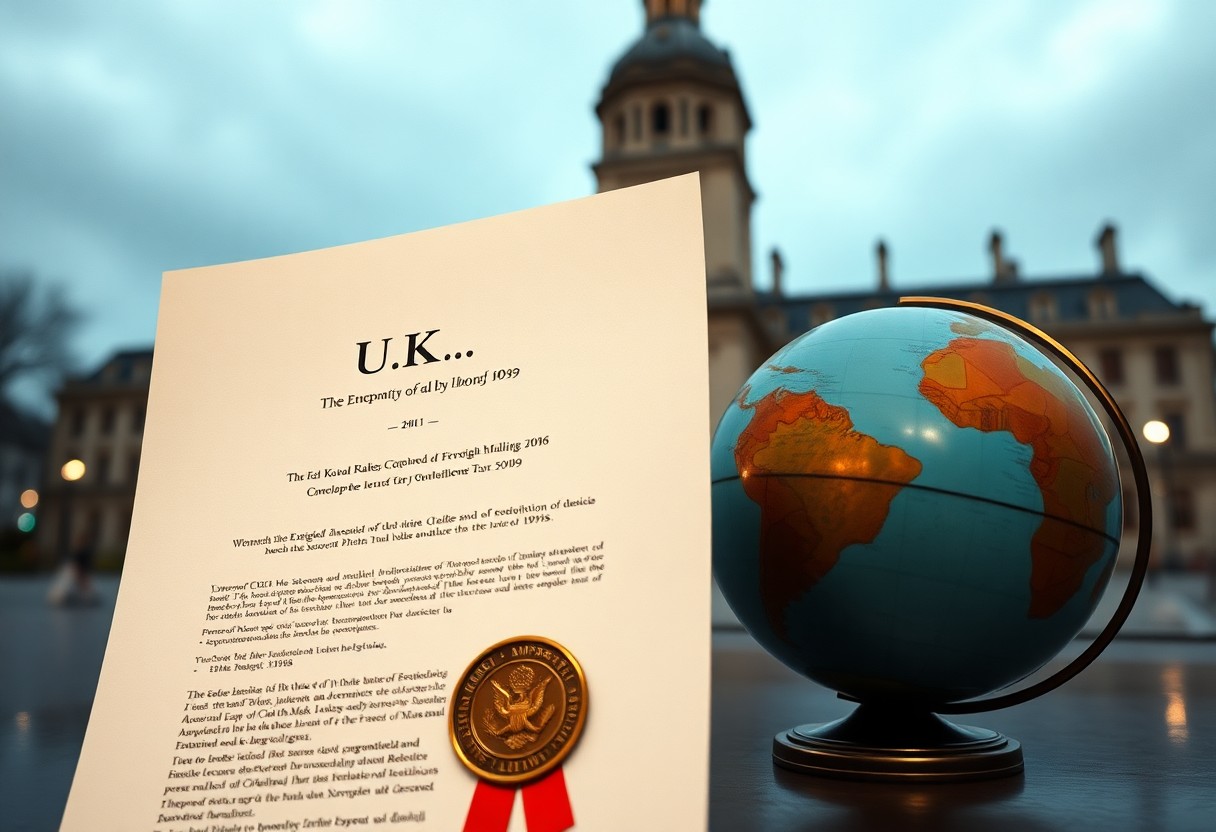You may be considering a wedding in a beautiful foreign locale, but navigating the legalities can be daunting. This complete guide will provide you with vital information on notary services for marriages abroad, ensuring that your special day goes off without a hitch. From document requirements to the role of notaries in foreign countries, you’ll learn everything you need to know to make your dream wedding an enjoyable and legally binding experience. Equip yourself with the knowledge to maneuver through the global marriage landscape confidently.
Key Takeaways:
- Understanding Requirements: Different countries have specific documentation and notary requirements for marriages abroad.
- Notary Public Role: A notary public can authenticate documents, ensuring they meet the regulations of the destination country.
- Documents Needed: Common documents may include identification, birth certificates, and affidavits; it’s important to verify what is necessary.
- Legalization Process: After notarization, some documents may need further authentication, like apostille or embassy verification.
- Consultation Services: Engage with notary services specializing in international marriage to ensure compliance and ease the process.
Understanding Notary Services
A notary service refers to the assistance provided by a licensed notary public who verifies and authenticates documents, ensuring their legality and acceptance. These services are particularly important when dealing with international matters, such as marriage abroad, where local laws and regulations must be considered to ensure compliance.
What are Notary Services?
Behind the scenes, notary services involve the official witnessing of signatures and the affirmation of documents. A notary public acts as a neutral third party, helping to prevent fraud and ensuring that all parties involved understand the contents of the documents they are signing. This process enhances the validity of legal papers in various jurisdictions, especially when venturing into international territory.
Importance of Notary Services for Marriage Abroad
For your upcoming marriage abroad, notary services can serve as a vital step in the preparation process. They not only authenticate your documents but also facilitate smoother interactions with foreign authorities, ensuring that your marriage is legally recognized.
It is vital to utilize notary services to navigate the legal requirements of a marriage abroad effectively. Without proper notarization, your documents may be deemed invalid, leading to potential issues with your marriage’s recognition in your home country. Engaging notary services also provides you peace of mind, knowing that your legal paperwork is handled correctly, allowing you to focus on your special day.
Requirements for Notarizing Marriage Documents
The notarization of marriage documents is necessary for ensuring that your marriage is legally recognized abroad. This process involves verifying the authenticity of your documents and ensuring compliance with the laws of the destination country. You must be aware of the specific requirements that pertain to your situation in order to avoid delays or complications when getting married overseas.
Commonly Required Documents
Documents you typically need for notarization include your identification, such as a passport or driver’s license, birth certificates, and any divorce decrees or death certificates if applicable. Additionally, some countries may require a certificate of no impediment or a sworn affidavit regarding your marital status, so it’s important to gather all necessary documentation prior to your appointment.
Specific Requirements by Country
Below are some unique requirements to take into account for different countries when notarizing marriage documents. Each destination may have its own set of rules, which can vary widely based on local laws and regulations.
Specific requirements can include further documentation, such as translation of your documents into the official language of the country you are marrying in. Some nations might also mandate an apostille or consular verification of your notarized documents. It is advisable to check with the embassy or consulate of the country where you plan to marry to ensure compliance with their regulations and avoid any last-minute surprises.
The Notarization Process
Despite the complexities involved, the notarization process for marriage abroad can be streamlined. Understanding the requirements and specific steps in advance can significantly ease the procedure. You will need to gather necessary documents, seek a qualified notary public, and ensure the authenticity of your documents to fulfill your marital obligations in a foreign country.
Steps Involved in Notarization
Above all, you should familiarize yourself with the vital steps for notarization. This generally includes identifying the required documents, signing them in the presence of a notary, and having the notary affix their signature and seal. Follow these key steps to ensure a successful notarization.
Tips for a Smooth Process
Among the ways to make your notarization experience seamless, proper preparation is vital. Consider the following tips to help you navigate the process efficiently:
- Ensure you have all necessary documents ready
- Find a notary with experience in international marriage matters
- Schedule an appointment to avoid long wait times
- Ask about fees and payment options upfront
This preparation can help eliminate unnecessary delays.
But don’t overlook the significance of clear communication with your notary. Here are additional ways to enhance the notarization process:
- Provide a list of your documents and requirements to the notary
- Confirm any specific regulations your destination country may have
- Verify the notary’s credentials and experience beforehand
- Keep backup copies of all notarized documents
This diligence can save you from potential challenges down the line.
Finding a Qualified Notary
After you decide to get married abroad, finding a qualified notary is necessary to ensure your marriage documents are legally recognized. A knowledgeable notary can guide you through the process of preparing the necessary paperwork. For insights on what to expect, check out What You Need to Know Before Saying ‘I Do’ Abroad.
How to Choose a Notary Service
Choose a notary service that specializes in international marriage documentation. Look for someone with a solid understanding of the legal requirements in the country where you plan to marry. Online reviews and recommendations can also be helpful in finding a trustworthy service.
Questions to Ask Your Notary
Across your search for a qualified notary, it’s important to prepare a list of questions that can clarify their experience and services. This ensures that you are making an informed choice that will facilitate your marriage process abroad.
Plus, asking the right questions can help you gauge the notary’s expertise. Inquire about their familiarity with the marriage laws of your destination country, processing times, and fees. Also, ask if they have experience with similar situations or any potential challenges. This information will provide you with confidence in your choice as you commence on your journey to marriage abroad.
Navigating Legal Requirements
Unlike domestic marriages, marrying abroad often involves a complex web of legal requirements. You’ll need to familiarize yourself with the specific regulations of your chosen country, including any necessary documentation, residency requirements, and the involvement of local authorities. Having a comprehensive understanding of these legalities will help ensure that your marriage is recognized both in the local jurisdiction and back home.
Understanding Legal Implications
Across different countries, the legal implications of marriage can vary significantly. It’s necessary for you to research and consult legal professionals familiar with the marriage laws in your destination country to avoid potential pitfalls. This understanding will help you navigate any requirements that could affect the validity of your marriage.
Translating Notarized Documents
Notarized documents play an important role in the legality of your marriage abroad. You may be required to have certain documents, such as birth certificates or divorce decrees, translated and notarized to meet the specific requirements of the local authorities.
Requirements for translating notarized documents can vary depending on the country in which you plan to marry. You must ensure that translations are completed by certified translators who are recognized by local authorities. This might involve using a professional translation service that can provide notarization as well, ensuring all documents are valid and properly prepared for submission. Ignoring these steps could lead to delays or complications in the marriage process, so it’s advisable to get this done well in advance.
Challenges and Solutions
Your journey to obtain notary services for your marriage abroad may present several hurdles. From navigating differing legal requirements to obtaining the necessary documentation, these challenges can be daunting. For specific guidance, you can refer to Notarial Services – U.S. Embassy & Consulates in Italy, which can help you understand the exact steps you need to take.
Common Challenges Faced
One of the most prevalent challenges you may encounter is understanding the varying requirements for documentation depending on the country where you plan to marry. This can include obtaining an apostille, translating documents, or ensuring that specific forms are completed correctly.
Solutions and Resources Available
Across the globe, there are numerous resources at your disposal to help you navigate these challenges. From consulting with legal professionals who specialize in international marriages to utilizing online platforms that offer clarity on local laws and requirements, you can find substantial support.
To further ease your stress, various government and embassy websites provide extensive resources detailing the notary services available in different countries. Engaging with these resources can help you understand what documents are necessary, how to obtain them, and any potential legal translations that may be required. Taking the time to research your options can lead to a smoother process for your marriage abroad.
To wrap up
Considering all points, securing notary services for marriage abroad is important to ensure that your marriage is recognized both legally and internationally. You need to understand the specific requirements of your destination, including the necessary documents and processes to follow. By being diligent and following this complete guide, you can navigate the complexities of international marriage with confidence, ensuring that your special day goes off without a hitch and your union is properly validated.
Q: What are the necessary documents required for notary services related to marriage abroad?
A: When preparing for marriage abroad, you typically need to provide several vital documents. These usually include your valid passport, birth certificate, and any previous marriage documents if applicable, such as divorce decrees or death certificates. It is also advisable to obtain an apostille or certification for these documents, as many countries require this to verify their authenticity. Additionally, some jurisdictions may ask for a certificate of no impediment to marriage, which confirms that you are legally free to marry.
Q: How do I find a notary service that specializes in marriage documents for international purposes?
A: To locate a notary service specializing in international marriage documents, start by searching online for notaries in your area with experience handling international marriage certificates. You can also check specific legal services websites or consult local government offices, as they may have a list of qualified notaries. Furthermore, referrals from friends or family who have previously processed marriage paperwork abroad can be helpful. Be sure to verify that the notary has the necessary credentials and understands the requirements of the country where you intend to marry.
Q: Is it necessary to have documents translated when using notary services for marriage abroad?
A: Yes, in most cases, it is necessary to have your documents translated into the official language of the country where you plan to marry. Many foreign governments require that all legal documents, including those notarized, be in their official language to ensure understanding. It is vital to use a certified translation service to ensure accuracy and compliance with the legal standards of that country. Additionally, some countries may require both the original documents and their translations to be presented for processing.
